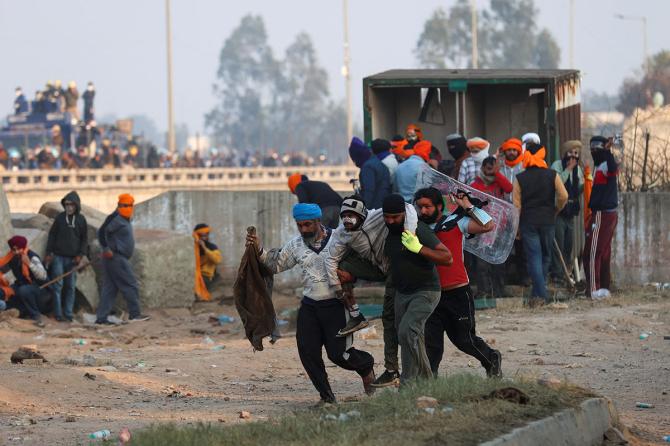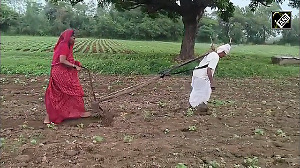'Had they agreed to our demands that we raised two years ago, we would have never started our agitation again.'

Farmers have rejected the central government's offer on MSP and have announced their intent to go ahead with the Delhi march on February 21.
The two sides met four times and, while the government was willing to concede some of the demands of the farmers, who however felt it was not enough.
Why did the talks break down and why have the farmers come on the roads to agitate after two years?
Syed Firdaus Ashraf/Rediff.comspoke to , one of the organisations which is participating in the agitation, to know more.
City-dwellers feel oh no, farmers have come on the roads once again to cause traffic jams in their lives. And this, after they did the same thing two years ago.
So why are you marching to Delhi?
People in cities must understand this fact that if the farmers do not get a good price for their crops then they will stop farming. This will lead to you, as a city consumer, buying wheat and rice at the same price as a McDonald's burger which could be around Rs 500 a kg.
Nobody does business at a loss. Today, farmers are bearing losses in farming therefore they are asking for a minimum support price for their crops from the government.
If the farmer does not get MSP, then farming as a profession is unviable for him.

But why are you on the roads now after two years?
This is because the Government of India has not kept its word to farmers.
Two years ago, the government told us that we will get a legal guarantee on our crops but it is yet to see the light of the day.
They formed a committee at that time which went nowhere.
They promised writing off our debts and yet they never did that.
The cases which were framed on farmers during the agitation held two years ago have not been withdrawn yet.
Ajay Mishra Teni is a Union minister and no action has been taken against him though his son has been involved in the killings of farmers at Lakhimpur Kheri.
We have been pleading with the government for the last two years, but they never heard us.
The agitation which you are seeing today was called two months ago and the government was given a notice in advance but they did not do anything to address our issues.
The government has been sleeping on the farmers issue for the last two years and they wake up only when you come on the roads to awaken them.
Had they agreed to our demands that we raised two years ago, we would have never started our agitation again.

You are demanding MSP on 23 crops and the well-known agricultural economist Ashok Gulati has written in the Indian Express newspaper that these 23 crops are consumed by only 28 percent of the Indian population whereas poultry, fisheries and horticulture have greater intake in terms of percentage and yet those producers never demand MSP.
Is your demand not wrong?
No, our demand is not wrong.
Any crop-growing process will be viable if that crop is economically viable to grow.
I know what Ashok Gulati is saying, but there are misleading facts too in his article. There are some points, though, which he has said is right, that the policies favour consumers and not producers (farmers).
Today, if a farmer wants to export his wheat, then he will easily get Rs 40-Rs 50 per kg but he is not allowed to do so because of government policies.
We have restrictions because people sitting in cities like Mumbai or Delhi must get cheaper wheat.
Now, when a farmer is getting more money for his wheat selling it abroad, why then does the government force us to sell it cheaper to city-dwellers?
This viewpoint of farmers must be understood by city-dwellers.
You think of the Indian Army only when there is war and in the same way you will understand the value of farmers when there is drought and hunger.
At this moment the city-dwellers have their stomach full so they are not respecting farmers. Tomorrow, if there is less produce of farm goods due to climate change, you just see, farmers will be worshipped like gods.
You can buy an expensive Samsung phone or if it is not available an Apple phone, but there is no replacement for wheat and rice.
There won't be any future medicines too which you can just eat and survive because rice and wheat can never be replaced.
The most important thing for human beings after air and water is food.
And if the person who is producing the food does not get good rates, it is an atrocity on that person.
We do not have problems with consumers in cities too as they are already paying Rs 40 per kg for wheat but it is the middleman who buys wheat from us for Rs 15 per kg and sells you the same at Rs 40.
We will be happy if you give us Rs 23 per kg too, and that is what we are talking of MSP.
You mean it will be a win-win situation for both consumers in cities and farmers?
Yes, but you have to understand the mentality of city-dwellers and middle class in India. They will never bargain when they go to eat in hotels, but while taking autorickshaws they will always argue with the driver over extra 10 rupees.
They will also do the same thing when they go to buy vegetables from a small vegetable vendor but never go and tell McDonald's that they won't pay a higher price for burgers because they know that they will be told to get out.
They do this because they know a vegetable vendor or a rickshawallah is a weak person and will not be able to do anything.
The middle class consumers bargain only with people who are lesser mortals than them. They will never do bargaining when they buy multinational company products.
And when farmers ask for extra two rupees for his produce, the same middle class is pinched to buy his produce for that extra two rupees.
Ashok Gulati, whose name you mentioned, his own report says that Rs 45 lakh crore was taken away from farmers and put in the kitty of consumers.
This is done by the Government of India.
Why is it that poultry farmers or milk producers do not fight for MSP and depend on market forces? They are still growing by 5 to 8 percent every year. Why do you all want MSP then?
The fact is every kind of farmer is disturbed and not happy in his business. You must have seen many times milk produce is thrown on the roads by producers because they do not get a fair price for their milk.

On social media we see new tractors driven by farmers in the protest and brand new cars too sometimes. This makes people in cities believe that the farmers are not that poor as they portray. He does not pay even taxes.
First, let me clarify on the tax issue.
No office-goer earning below Rs 7 lakh pays taxes.
This, when you compare with the average farmers income which is Rs 1.5 lakh a year, so how do you expect him to pay tax?
There is no tax in the agriculture profession, agreed, but then there is no income too in the agriculture profession.
It is the big companies who benefit in the name of agriculture and the government portrays those figures as if the poor farmers are getting tax benefits.
And if some farmer's son who is settled abroad or is doing well gives money to his parents then you cannot call that farmer rich.
Farmers driving Mercedes is all farzi baatein (fake talk).
Even for a minute you believe that farmers are dressed well, what is the problem in that? You want to see farmers in phatey-haal (torn clothes)? Why do you have this perception?
Some people said in TV debates that earlier farmers used to commit suicide but not anymore. It means it is okay if a farmer commits suicide, but he should not agitate and demand for his rights.
The city-dwellers are upset as to why farmers have come to the city to protest without even thinking that it is their produce, food grains that you eat in your homes.
You eat his produce, but you do not want him to enter Delhi. Is there a Constitutional provision which states that farmers cannot come to Delhi to protest?
And if yes, we must also find out what Constitutional provision is there to punish the government if they go back on their promised words to farmers.
There is no discussion on these issues in middle class city homes.
Maybe they don't because it doesn't affect the lives of city-dwellers.
I will give you one example of Polson butter that used to be a dominant brand in India (till the 1970s). It was only later when Dr Verghese Kurien of Amul bought milk directly from farmers and formed Amul cooperative that farmers started benefitting.
Today, 80 percent of what you buy from Amul products, that money goes straight into the farmer's pocket.
When you compare that with food grains, then what you pay as a middle class consumer, only 50 percent of that money goes into the farmer's pocket. Therefore, we are only demanding just like Amul farmers get 80 percent of their produce, why should other farmers be left out?
We must also get the money which is due to us. Therefore, when you have cooperatives like Amul, farmers will get the right price.
- Part 2 of the interview: 'Govt is wasting time till Model Code of Conduct'











